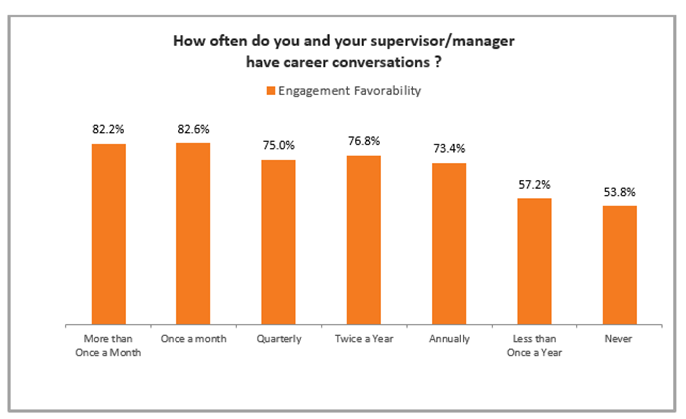
Career Development Conversations Matter
Career development conversations are a must for new managers looking to create a high performing and engaged team. While most new manager training focuses on helping new managers navigate their own careers, it often neglects how to successfully help their direct reports navigate their own careers. We maintain that it is critical that managers pay close and regular attention to the careers of their individual team members.
Should Career Development Conversations Follow Performance Review Trends?
From assessing organizational cultures, we know that the clumsy and ineffective annual performance review is quickly on its way out. High growth organizations are shifting toward consistent and more frequent performance conversations. We wondered if employee career development conversations should follow suit.
Would discussing employee career opportunities and paths more frequently have the same positive effects as more regular performance conversations — increased engagement, motivation, and performance?
We did the research and tested it out in our career development training programs to find out.
Employee Engagement Context to Set the Stage
Let’s start by setting some context regarding employee engagement. We define employee engagement as the combination of:
Why Employee Engagement Matters to the Organization
Companies with higher levels of employee engagement report 18% greater productivity, 12% higher customer satisfaction, and 51% less voluntary turnover. Companies with lower levels of employee engagement report 12% lower profits, 19% lower operating income, and 28% lower earnings per share.
The Career Development Research
In a research study earlier this year, we found that employee engagement surveys should be conducted annually to foster the highest levels of employee engagement. Our study on the effectiveness of career conversations was similar. We put our philosophy to the test…
Do career conversations (where employees and managers discuss employee career paths, opportunities for advancement, and ways to learn and grow in their careers) that occur on a more frequent basis positively impact employee engagement?
The short answer is yes.

Applying the Career Development Research to Management Development
The research has greatly informed our new manager training programs.
What Surprised Us the Most
Surprisingly, there’s not a distinct difference between having quarterly or annual career conversations, which suggests that — from a resource and time management perspective — it’s better to have annual conversations. However, engagement spikes up sharply when moving from quarterly to monthly career conversations.
And because the difference is negligible between “more than once a month” and “once a month,” these results paint the following picture: monthly career conversations are optimal for the best engagement results.
The Bottom Line
We believe that any meaningful conversations between managers and their followers increase employee engagement by strengthening the connections between employees and their job. Frequent check-ins by managers show employees that you care about their well-being and want to do all you can to help them be successful. Keep tabs on how things are going for your team and provide relevant growth opportunities to enhance their path forward.
To learn more about how managers can best engage their top talent, download The Top 10 Most Powerful Ways to Boost Employee Engagement.
Explore real world results for clients like you striving to create higher performance